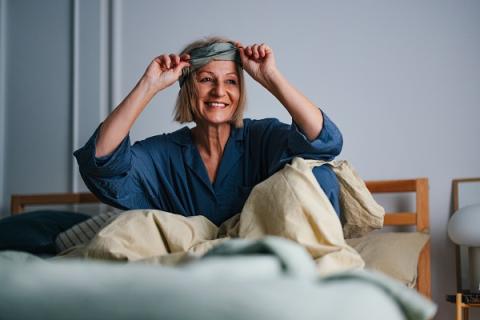Healthy Sleep Habits for Older Adults
The long-term consequences of inadequate sleep
When sleep quality declines, the effects go beyond just feeling tired during the day. Poor sleep over a long period of time can cause anxiety, depression, mood disorders, and a reduced quality of life overall, according to Dr. Brienne Miner, assistant professor of medicine (geriatrics) at Yale University. Physical issues like high blood pressure, stroke, diabetes, and weight gain can also be symptoms of poor sleep.
One of the most concerning consequences of poor sleep is its impact on cognitive function and connection to diseases like Alzheimer’s and dementia. In a study of sleep in older adults, Cathy A. Alessi, MD, and Jennifer L. Martin, PhD, found that sleep problems are common for older adults with neurodegenerative disorders, such as Parkinson’s or Alzheimer’s. “The sleep disorders identified may be due to the primary symptoms of the neurodegenerative disease itself or may result from damage to sleep-controlling centers in the brain.” More research can help solve a chicken-and-egg problem between these connections—is poor sleep a symptom of these diseases or a cause?
What causes poor sleep in older adults?
Many factors can contribute to poor sleep in older adults. Lifestyle changes, such as when someone retires or enters a long-term care facility, can cause a change in routine. Mental health conditions such as anxiety and depression can worsen sleep. Physical health conditions such as Restless Leg Syndrome, diabetes, insomnia, heart and lung diseases, sleep apnea, and even joint pain can cause interruptions in sleep or difficulty falling asleep. Even medicine can impact the quality of your sleep.
Tips for better sleep in older adults
When it comes to improving your sleep, Dr. Brienne Miner, assistant professor of medicine (geriatrics) at Yale University suggests using medicine as a last resort. “While medications can sometimes help in the short term, long-term use of sleep aids has been linked to adverse effects, including an increased risk of dementia,” she says in an article for Yale University. Luckily there are plenty of non-medicinal approaches to improving sleep.
- Set a sleep routine: Wake up at the same time every day and go to sleep at the same time every day to help reset your circadian rhythm. Creating a pre-sleep routine can also help your body wind down after a long day. Consider reading a book, listening to soft music, or taking a warm bath before heading to bed every night.
- Set the scene for peaceful sleep: Keep your room dark, cool, and quiet to help you relax before bed. Black-out curtains can help keep out light. White noise machines or earplugs can help cut noise. An important note: falling is a huge risk for older adults who have sleep problems. Make sure your loved ones sleep safe by adding a nightlight, emergency phone, or nurse call button nearby.
- Stay active and social. Don’t let bad sleep keep you from getting exercise. Daily movement can help tire you out and prepare you for a restful nights sleep. Even light activities like walking or chair yoga can help you sleep better at night. Social engagement and exercising your mind are equally as important. Staying connected to friends and family can help improve emotional well-being, which could help you sleep better.
- Adopt healthy sleep habits. Long naps during the day can make it harder to sleep at night. Keep any necessary day time naps to 30 minutes. Avoid heavy meals, alcohol, and caffeine before bed. Give your eyes a break by shutting off screens at least half an hour before you lay down to sleep.
- Use supplements first, medicine second. If you’re still having trouble sleeping, try herbal supplements like melatonin or an herbal tea to wind down.
- Talk to your doctor. If a medical condition is causing poor sleep quality, its important to talk to your doctor about treatment. Many common sleep issues can be treated. Talk to your doctor about improving your sleep.
